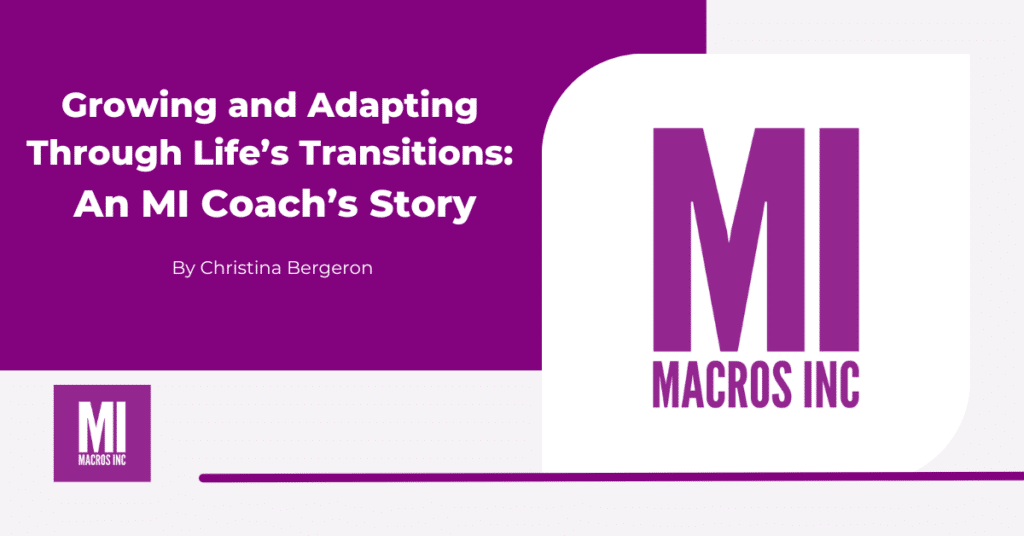By Christina Bergeron
Embarking on any fitness journey, be it fat loss, maintenance, or muscle building, goes beyond the physical; it’s an emotional rollercoaster, especially during life’s unpredictable transitions. As both a coach and client at Macros Inc., I’ve navigated these ups and downs personally. My story, shaped by my husband’s deployment, echoes the challenges many face – from moving homes to career changes. Let’s dive into this journey together, exploring how resilience and adaptability become our greatest allies.
Jump to a Topic
The Deployment: A Shift in Priorities
My life took a turn in early August when my husband was deployed. If you’re familiar with deployments of a military lifestyle, you can be as prepared as possible, but it seems never to be enough. This left me managing our household single-handedly, a daunting task that abruptly altered my daily routine. During this challenging period, I realized something vital: sometimes, it’s okay to pause and reassess our fitness and nutrition goals.
Initially, I thought I could continue my weight loss journey uninterrupted. However, I soon recognized the emotional toll the deployment was taking on me. I wasn’t ready to put additional pressure on myself. With guidance from my Macros Inc. coach, I decided to spend a month accepting my new reality. My focus shifted to maintaining my current state keeping up with my steps and workouts. I tracked my nutrition sporadically but without the pressure of consistency.
This was a time for processing emotions, not for rigorous dieting. I found solace in my hobbies, particularly art. Engaging in activities you love, be it crafting, working out, or reading, can significantly aid in emotional processing. It’s essential to find something that not only occupies your time but also brings joy and a sense of peace.
Setting New, Achievable Goals
Come September, I felt a renewed sense of determination. It was time to focus on movement and building habits that served my goals. I set an ambitious goal of walking 200 miles and committed to getting 8 hours of sleep each night, even if it meant skipping a workout. For four weeks, these were my sole objectives.
Through meticulous planning with the help of my coach and adjusting for less active weekends, I not only met this goal but surpassed it, walking over 250 miles. Breaking down this ambitious target into daily goals and adjusting my weekly activity to compensate for quieter weekends was the success behind this goal. It’s about setting realistic, achievable targets and being flexible enough to modify them as needed.
During this time, I also explored new recipes, journaled nightly, and prioritized self-care activities that rejuvenated me, all at my own pace.
Returning to Tracking with a Flexible Mindset
By October, I was ready to dive back into tracking my macros. But this time, I aimed for an 80% consistency rate, hitting my macros 24 out of 31 days. This approach allowed for flexibility; I could enjoy ordering out or having a treat like ice cream occasionally.
It wasn’t about eating poorly but about larger portions of planned meals or choosing convenient options like pizza while staying within my deficit. During these two months, I maintained my weight, practicing mindful eating even when ordering out. It wasn’t about stringent dieting; it was about making choices that align with your goals while also allowing for life’s little indulgences.
Honesty, Compromises, and Application
Throughout this three-month process, honesty with myself was pivotal. I learned to negotiate with my cravings and emotions, like talking myself down from 25 Hershey kisses to a reasonable 8, and tracking them. This journey was filled with compromises to steadily move closer to my goals. Some were easy, and many not so much, but I knew that the choices I made and followed through on were going to match my expectations during this time.
The approach I took can be applied to any life transition we might be facing. The key is to work closely with your coach or even with just yourself, set realistic goals, and maintain a flexible, compassionate mindset towards yourself. Whether it’s a move, job change, or any personal loss, remember that it’s okay to adjust your fitness and nutrition journey according to your current life situation.
Strategies to Try
Lean on your support network, be it a coach, accountability partner, or a trusted family member or friend. This support is invaluable in navigating life’s changes. When setting goals, remember the power of breaking them down into smaller, manageable steps. This method transforms overwhelming objectives into achievable milestones. As life evolves, so should your goals and routines; staying flexible is crucial for effectively managing transitions.
Mindfulness and self-care play a pivotal role in maintaining a balanced perspective, especially during challenging times. Whether it’s through engaging in hobbies, practicing meditation, or simply carving out moments for yourself, these activities are essential for your well-being.
Never underestimate the strength that lies in a supportive community. Connecting with others facing similar situations can provide comfort, insight, and a sense of shared journey. Regular reflection is also key – it allows you to gauge what’s effective and what might need adjustment. Be open to adapting your approach as you gain deeper insight into your personal needs and responses during these transitions.
Wrap up
Transitions, whether personal or professional, are part of life’s journey. They are opportunities for growth, learning, and self-discovery. As I continue to navigate my own transitions, I hope my story inspires you to embrace your journey with resilience, flexibility, and a heart full of hope. With the right mindset and support, you can weather any storm and emerge stronger on the other side.
Try our nutrition coaching, for free!
Be the next success story. Over 30,000 have trusted Macros Inc to transform their health.
Simply fill out the form below to start your 14-day risk-free journey. Let's achieve your goals together!



